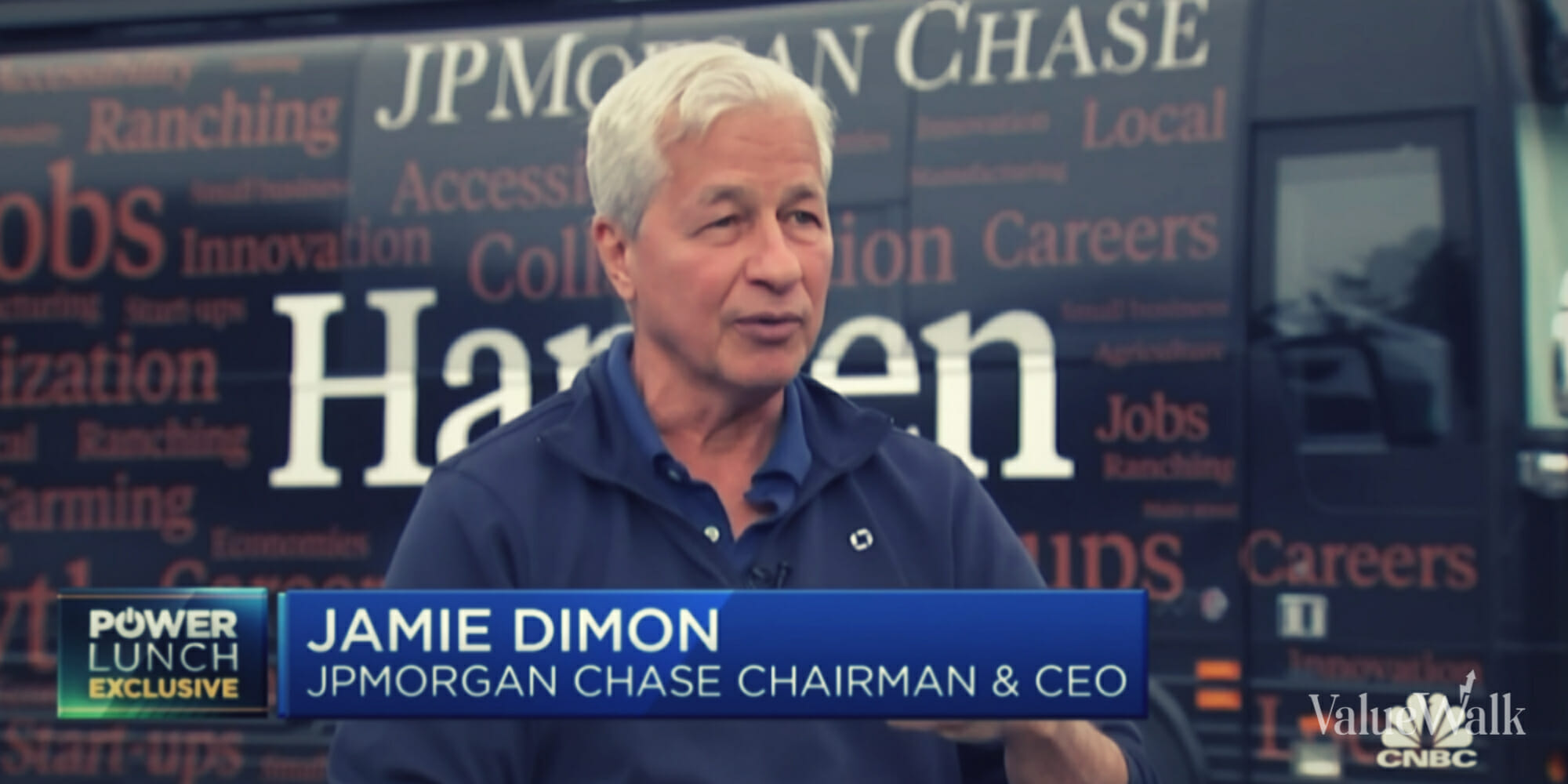Following is the unofficial transcript of a CNBC exclusive interview with JPMorgan Chase & Co (NYSE:JPM) Chairman & CEO Jamie Dimon on CNBC’s “Power Lunch” (M-F, 2PM-3PM ET) today, Wednesday, August 2.
JPMorgan CEO Jamie Dimon Calls Fitch Downgrade Of U.S. Credit ‘Ridiculous’
LESLIE PICKER: Hey, Kelly, thank you so much. And thank you, Jamie, for being here. So you’ve got a big bus behind you. You are here on your annual bus tour. This year, it comprises, what you will have dubbed expansion markets in the Northwest, in the Rockies. Why here? What do you see as the opportunity here?
JAMIE DIMON: First, we love these bus trips. It’s like 12 years, we try to go off the beaten path. And when we do them we see clients – I’m about to have lunch with you know, 100, 150 clients of ours. We go to the branches, we get to talk to our people. On the bus, we sometimes have branch managers and loan officers and small business tellers, and we ask them, what can we do better.
We give him immunity and beer. We actually want to know. It makes us a better company. We have a lot of fun. And then we do places we haven’t been before. So we’ve been expanding to Montana, Idaho, Washington state, so we are in Spokane, Boise, and now in Bozeman, and it’s just fun to do and a great time. And we learned a lot.
PICKER: What have you learned so far this year?
DIMON: Okay, so this is for folks and CNBC. Leave California, New York, come visit Montana, and Idaho. And you know what America is alive and well. The innovation is unbelievable. The people get along. It’s not all about the polarization you read about. The innovation is everywhere.
People think Silicon Valley, but I met with a company here called Bridger Photonics run by Peter Roos and all that does monitoring of methane gas and they are doing a lot of work with all the big oil companies about how to improve their emissions and stuff like that. It’s extraordinary.
And it’s built here, you know, Gibson guitars are now built here. I met Interstate Cargo in in Boise and they built a whole big business – a Russian immigrant. That’s America. We should be applauding the beauty of America and all the things that it does and free enterprise.
PICKER: Well, let’s talk more about America because Fitch you know, big news today, obviously, is the downgrade of US debt down to AA plus. What’s your take on that decision?
DIMON: I’ll give you a couple of quick things. It doesn’t really matter that much. You know, the markets decide. It’s not the ratings agencies who make these big decisions. Number two, they point out some issues, which we all knew about, about our debt ceiling crisis and things like that. But number three most important the American public – this is the most prosperous nation on the planet.
It is still the most prosperous nation on the planet. It is the most secure nation on the planet. And I would point out to the ratings agencies if I could that they’re a bunch of countries rated higher than us like AAA, but they live under the american enterprise military system. France – have them be AAA not America is kind of ridiculous.
PICKER: These are countries like Canada, and others.
DIMON: Yeah.
PICKER: You know, in terms of the actual decision making behind the downgrade, it had a lot to do with political brinksmanship surrounding the debt ceiling debacle, the deficit itself, I mean, do you agree with any of those –
DIMON: Those are issues. This is the most prosperous nation on the planet. North America, we have the Atlantic and the Pacific, the best military, the best economy the world’s ever seen, the most innovation. The credit is sound. It should be the highest rated credit in the world. And yes, there are issues about being raised publicly. I agree with that. We should get rid of the debt ceiling.
PICKER: We should get rid of the debt ceiling –
DIMON: We should get rid of it. It’s used by both parties. And it’s always used in a way that makes it very difficult. We need certainty in the world, and we should have more of it.
JPMorgan CEO Jamie Dimon: The Humanitarian Crisis In Ukraine Is ‘Extraordinary’
PICKER: Okay, let’s talk about your thoughts on the economy. Because, you know, you’ve you’ve been conservative with your balance sheet for a while now. You know, you said that a year ago, actually last June at a financial conference that the firm was bracing itself for a hurricane. And then you noted that could be a minor one or Superstorm Sandy. And then you later downgraded that threat to storm clouds. So what’s your macro meteorology telling you right now?
DIMON: I actually did not downgrade it. I just used a different phraseology, that gets over treated. So again, the big picture is America is resilient, unbelievable. Etc. We have a little bit of an anomaly a very strong consumer, low unemployment, we are growing as a country, still innovation, the consumers still has more money in their income – in their checking accounts than they had pre Covid, their home prices have gone for 15 years, asset prices go on for 15 years, it’s pretty good.
Even if we go into recession, they are going in with a very good balance sheet, not a bad one. And businesses are in good shape. That’s the good part. The storm cloud part is still there, which is things you know, I’m not worried. When I see people are talking about I’m worried about this and worried about that. I don’t worry that much. You know, you can get worried about just about anything you want. I think people do too much of that.
And I agree with Warren Buffett about the resilience of America. But there are two things out there, which are – give me heightened concern. One is the fiscal spending and the quantitative tightening. We’ve never had quantitative tightening. And I do think that might bite at one point. And I’m not – don’t want to be surprised about it and the second is Ukraine. The humanitarian crisis in Ukraine is extraordinary.
The impact in oil and gas and food and migration, it can expand – its nuclear proliferation is nuclear blackmail. This is serious stuff, which we have not really faced since World War II. So I put that in the cautious category. Hopefully that will sort out and everything –the world will be safe again. I hope people learn the world is not that safe, it will never be that safe. And we have to be very, very careful how we do that.
And so how that affects the economy is different, but they are out there. And you know, and the consumer is spending their money down. So I don’t know if you have a soft landing and medium landing or hard landing. I’m actually much more concerned about this geopolitical stuff, all things being equal.
PICKER: And, of course, you mentioned QT as well. You know, you’ve said previously at investor day that everyone should be prepared for rates as high as 7%. And there’s a narrative out there that June is softer than expected, CPI print is indicative of, you know, kind of this mission accomplished. We’re all good. Inflation is under control. Do you agree with that narrative?
DIMON: No. I think people over look at short term data. You know, all that – if you actually dig into the data, you probably wouldn’t pay much credence to it. And so it goes up, it goes down, I think you gotta look at a little bit more. And when I’m saying 7%, I’m not saying it’s going to happen. I’m saying, as a business person, there are reasons why it might happen, and you should be prepared for it.
You never want to be in a position and say, I didn’t expect oil to go to 120 or 130, interest rates go up 500 basis points, and therefore I’m bankrupt. We should all be prepared for those types of things. But there’s been a sea change in capital flows around the world. Governments have to sell more debt than ever before.
All governments including the United States. Some say less than down deficits, they’re not down from pre Covid. Debt levels are very high, they are selling more debt, interest rates have gone up. Central banks are selling, they were big buyers, now they have to sell for QT, we’ve never had QT before. And then also this new economy of ours, the green economy $4 trillion a year.
IRA ship sacked militaries around the world, almost every country is beefing up its military a little bit. These things may be a sea change, and we’ve seen about capital demand. And I think there’s a good chance that you guys, you know, in six months or nine months when we talk about crowding out, and so we’ll find out, you know, the 10 year bond just went to 410, I think you can easily go to 5%. I’m just saying people should be prepared for it. Don’t be afraid of it. Just be prepared for it.
PICKER: Well, how do you see that net/net, you know, playing out? Because you mentioned the fiscal spending side of it. And then that’s concurrent with Qt. So they’re kind of running counter to each other.
DIMON: They are. Yeah. There are contradictions in raising short rates, we still have a lot of liquidity, they are taking the liquidity out. But you know, the curve, a natural curve, one day might be, you know, three and a half from the short end and five in the 10 year end. And that’s maybe where we’re going. So what it leads to in the short run economy, I don’t know, I think some of these things can have real, real problems down the road if we don’t deal with them today. You’re really better off deal with them today than just letting them get worse over time.
Jamie Dimon: I’m More Worried About China And Cyber Than Bank Stress Tests
PICKER: But to your point, the consumer has been more resilient than expected. Some of that –
DIMON: Yeah, but because we spent $5 trillion over the two years of Covid.
PICKER: Right.
DIMON: That is extraordinary money that went into the hands of consumers and small businesses. So the government did the right thing to get us out of this terrible Covid – remember unemployment went from 4% to 15% I remember in like three months. But we continue spending and we continue to QT – QE for too long. And we’re gonna pay – we’re paying a price for that. And hopefully it won’t be too big a price.
PICKER: What do you think the price would ultimately be?
DIMON: Well I said, there will be higher interest rates. And I don’t know what it’s gonna do to the economy.
PICKER: In terms of the consumer, do you think they fully absorb that stimulus yet and absorbed the period of low interest rates we’ve seen for so long? You know, will we ultimately start to see the effect of that, you know, when the tide rolls in?
DIMON: Yeah. That’s what I’m talking about. The storm clouds down the road – you know, fiscal spending, QT, higher rates. We haven’t had the full effect of that yet. I don’t know what that’s going to do. I don’t want to guess about it. I don’t know and when I think when people spend their time forecasts and TV, they’re mostly wasting their time.
PICKER: Do you think the Fed’s done a good job?
DIMON: They did a good job early on. I think it is quite obvious it was too much. It was just their job. You know, fiscal spending, monetary spending. I think they they took too long, they’ve kind of said that. They caught up by going to 5%. They made sense to pause for a while. We’re gonna see. They may have to go a little higher. I don’t know. But they’ve caught up. I have enormous respect for Jay Powell.
PICKER: Let’s talk about the Fed in terms of regulation. Last week, we saw the Basel three end game, Basel 4. Some people call it increasing capital standards for especially the largest banks –
DIMON: Is there some way someone can actually quite that group down over there. Sorry.
PICKER: Is that a metaphor –
DIMON: I don’t know.
PICKER: You know, higher capital requirements for you all, what do you think is the overall impact from these new rules that have been proposed?
DIMON: First of all, I just want to be blunt. It is hugely disappointing. I think these rules are, I mean, I’ve always thought – was a joke. Now we have operational risk capital, which I think is equally bad based upon models, which kind of made no sense to me. And if I was the Fed, I’d be very careful about saying their models are perfect.
Remember their models didn’t show inflation and they didn’t show 5% interest rates and stuff like that. They lack transparency. I don’t know what they want the outcome to be. But I think they should be saying, Here’s what we want the outcome to be. And it can’t be just safe for banks. We have the best financial system in the world.
I don’t think there’s a lot of calibration among – you know, we have hundreds rules, lots of very little calibration among the rules and it can have a real effect on – you know, if they want to get push all mortgages and all small business banking in our banks, so be it. They should tell the American public that. And so they’ll have real effect on consumers so just – I’m going to take just mortgages, you know, the way I’ve read it so far in more detail to come, you know it’s gonna make it much harder to make a small mortgage.
And a mortgage to a lower FICO person. And I just think that’s a huge mistake from a policy point. You know, if that’s what they want, so be it, but they should tell the American public when we do this , it is going to reduce mortgage affordability and raise the cost – because that is exactly what it’s gonna do. And I could say the same thing about small business and a bunch of other impacts. So we’re going to adjust to it, I’m not sure it’s the right thing for America.
And we’ll be – we are still reading all the details. It’s 1000 pages long. I also want to point out it is 10 years after the crisis. So this has been going on for a long time. We need certainty, policy that you know, the stress test clearly didn’t work. So we – we do 100 a week, they do one and they act like that’s the real stress for the company. I’m far more worried about China and cyber than I am about that stress test.
And I just think and then another thing – we don’t have many conversations anymore. We should be having conversations with regulators about what we’re worried about, what they’re worried about. There’s almost none of that. So it’s both lack of transparency, lack of conversation with real practitioners. A lot of people in ivory towers a lot of opinions here. They’ve never been in the real world. I’d like to see them get in the boxing ring one day.
PICKER: Speaking of the recent banking turmoil, you said in your letter to shareholders in early April “the current crisis is not yet over. And even when it is behind us, there will be repercussions from it for years to come.” Do you think that these new regulations solve for that?
DIMON: No. To some of these folks, you know, to hammer a nail, that’s what this is. A lot of these folks are using every issue that takes place to justify what they already thought. The best advice I ever heard was use your brains to figure out the truth not to justify what you already think. So look, this is will sort out.
JPMorgan will be fine. I don’t think there’s a way to run a railroad. But you know, we have no choice. They do it. They – cost benefit analysis, they’re required to do that. They’re also required to adjust things to the size of the economy, the size of the banks, and none of that took place. So none of this calibration. And so I wish we did it. I think we’d have a healthier banking system. And I thought Dodd Frank accomplished a lot of stuff. I think this is way beyond that.
PICKER: What do you think are the repercussions from the banking crisis? Because there are reports out there that you all were directly involved in the Bank of California / PacWest deal that was announced last week. You personally received regular briefings as it came together, according to those reports.
You advise bank of California, in what some have called the rescue takeover of PacWest, you’re buying about $2 billion of mortgages to facilitate the deal, placement – for $400 million worth of private equity infusion here. Is this the playbook now for you know, potential stress that could arise?
DIMON: No, I called it a mini crisis. Only so many banks are offsides on interest rate exposure. Remember this, some of these things were incentivized by county, incentivized by regulators, you know, and we were not completely aware of how quickly deposits were like Silicon Valley Bank, First Republic, that didn’t happen anywhere.
So we were quite clear, we thought first Republic was the last domino a few others may sort out. PacWest, you know, thank god, it’s good for them. I’m glad they did a public type of transaction. So it’s over for now. But, you know, all the banks, you know, we’re the biggest bank, the community banks, regional banks, I support all of them and they reported the first quarter, they reported the second, most of them did okay.
They didn’t have runs in the bank, they earned money, they’ve got plenty of capital, you know, they’re preparing it looks like for potentially higher rates or, you know, maybe higher real estate laws or something like that. But it’s a sound system. You’re going to have failure. We shouldn’t act like every failure is a failure of the whole system.
But we should learn from every failure. And I think there are a lot of things we could have learned and done differently and they’re not in the new wrecks. There’s something that that should have been done slightly differently in other maybe potential requirements.
PICKER: Well, they did lower the threshold to those with $100 billion or more in assets, which would probably more, be more along the lines of a mid-sized bank.
DIMON: I’m not sure that would have made any difference to the Silicon Valley Bank but—
PICKER: You don’t think so?
DIMON: I don’t think so.
PICKER: What would have made a difference do you think?
DIMON: That that you don’t just stress one thing, but you stress multiple things. And then you that you look at other things, that you create liquidity. Liquidity is created in so many ways like we have so much liquidity but when things get bad, I cannot use it because of current rules.
I think there are ways that things can be set up and I won’t bore you all, credit facilities and stuff like that, credit facilities with the, you know, the FHLB or the Federal Reserve or something like that, where every bank actually has all liquidity they need to back up a major run in their bank. And so there are things to fix it. They are not in these new rules.
PICKER: And obviously the funding costs are higher when you do see some sort of run and so margins for the industry are under pressure as well.
DIMON: Yeah but some of that is just they—
PICKER: Temporary.
DIMON: No, some of that is just people have to pass on more of the, you know, the save, the earnings to their customers. That’s a normal thing. That isn’t because of the crisis.
PICKER: I see. You know, you mentioned First Republic, and part of this bus tour is actually, you know, meeting different First Republic legacy places. How’s the integration going?
DIMON: Excellent, you know, Jen Piepszak and Jen Roberts and Marianne Lake are doing it, — people are working on but here’s the most important thing. They did a lot of great stuff when we were just in all over Bozeman and all over the place, a lot of great customers they did some things very well, we want to incorporate that in how we do things but the integration itself everything, you know, the systems, technology, risk, audit, compliance, branches.
I am going to a branch later today, First Republic branch, they’ve got some great people and and we were able to assimilate it, help the people, save a lot of jobs and hedge literally within two days or three days all the — exposure so we didn’t add anything to our balance sheet by doing that and so the system is safer, we save those jobs and hopefully, we are going to do a great job for the clients.
PICKER: Do you have an appetite to do any more deals?
DIMON: Not really. I mean they don’t want us to which I think is fine, you know, they don’t, they don’t want big banks to do other deals to make them bigger which I think is fine. If you said again this goes back to regulations but I also don’t think that the FDI—you know, the public should know, we pay for the FDIC, it’s a mutual insurance thing so Silicon Valley Bank is probably going to cost us $2.5 to $3 billion.
And you know so I don’t want whatever happens when the next bank comes bid in, I want to make sure that bid is a reasonable bid and not where you know $10 billion extra is being given to a small bank. That is not fair to anybody so I think they need some clear rules about if you want to do resolution, recovery and I also think we made a huge mistakes on Silicon Valley Bank. I hope that regulators are gonna be looking at that one day, with one place, we created a crisis and we created a melting cube that maybe didn’t have to happen.
JPMorgan’s Jamie Dimon: We Don’t Recalibrate Regulations And It Slows Growth
PICKER: What do you think needs to be assessed from a regulatory standpoint there?
DIMON: I’m not going to go through it now but they should be asking a lot of questions of themselves like whenever we make mistake, we spend a lot of time on what I call the after action report, the post mortem. What did we do wrong, what can we do better? How do we make sure we’re doing it across our company? You know, we know we’re going to make mistakes. I don’t think we should treat every mistake like it’s a violation, morality or something like that but I think they should be doing a little bit of that, a little soul searching
PICKER: Do you think there is an appetite among regulators and appetite among the C-Suite to do more consolidation in the industry?
DIMON: I think the companies some companies need to and I think again I hear consolidation etc. It’s a dynamic system. It’s not a static system. They say there’s 4,000, they merged all to be bigger. There a lot of big companies that have gotten smaller because they didn’t do a good job. There are a lot of new companies Marcus, Ally Bank, PayPal, Apple basically is a bank today, you know, there are a lot of startups, I just drove by a bank, you know, here.
I’m sure it’s a startup bank and some middle sized banks and small banks, one emerged because they can do a better job for their customers or diversify their base more. It’s a dynamic system, let it happen.
And it’s a great system America has the best financial system in the world and the other thing I should say about regulation is I really do mean this, hedge funds and private equity are dancing in the streets because they’re just gonna pick up a lot of business because, but we do have the best system in the world including private equity, hedge funds, venture capital, middle market companies. It’s extraordinary.
That strength is part of the strength of America and part of what America free enterprise, the most important part, it’s not the money. It’s the people. It’s people starting things and growing things and moving places and having dreams and be allowed to further your dreams which has risk.
You know sometimes we make a loan that has risk. We want to make some risky loans. We want to help Bridger Photonics accomplish their goals and serve their clients and yeah sometimes, you know, we make a mistake or something like that though I think that’s a great company I’m not referring to them so.
PICKER, Well, what kind of music do you think they’re going to be dancing to because, you know, that that is the big criticism of increasing capital requirements is that it’s going to send business to the non-bank financials, the unregulated sector of the economy.
DIMON: Yeah so that’s not always bad. I’m not against competition but the mortgage business is now 80% outside of banks. Okay and that I don’t know what it’s gonna do with the rest of that. It makes it harder to do a small business loans, it makes it harder to do some risky loans and obviously a lot of that’s gonna go with the non-banking system.
That may not be all bad but again people should be analyzing the consequences and saying we want that to happen because it’s better for America and the citizens of America. I’ve never heard that statement. I think a lot of these things are done without any forethought about the ultimate consequences and very little calibration.
We really need to be very thorough about how we’re doing things so the banking system has been, you know, this has been going on now for 15 years. You know, and they should take a deep breath and analyze and think about it. If you look at our regulatory systems, not sure, I have this chart. I don’t want to have it, I was going to show it, yeah can you hand it to me? Thank you.
PICKER: Thank you.
DIMON: I made this chart and people made fun of me about our regulatory systems for banks. I don’t know if you can see it up close, there are so many people involved, there’s cross responsibility, no one’s really responsible and I’m not showing this because the banks. I’m showing this because we’re doing this for building bridges, opening schools, building roads, starting companies, starting small businesses.
We shouldn’t be crippling American, we should, we don’t recalibrate regulations all the time. What we really should be doing is what’s the best thing that works, acknowledging flaws, making modifications, we don’t do it. And I believe that some of this stuff is slowing down the growth of America. I wrote in my Chairman’s letter for 20 years we’re going to 1.7%. Had we been going at 3% which is definitely what we could get done, we’d have 15,000 more per person GDP which by the way is the GDP per person of China.
Ours is 80, theirs is 15. We would have been 95 today had we done stuff. I think this stuff has really slowed it down, bad policy making, bad regulations, thoughtless type of stuff. You know, it’s easy to pile more stuff on people.
George McGovern, the most liberal guy who ever ran for president wrote an op-ed I think in the Wall Street Journal after he ran for president, after he was a senator, he started, he bought a small inn somewhere and I think it was entitled if I’d only known how much these things hurt my ability to do, he spoke about OSHA and litigation and the ability to hire kids.
And all these things that you know maybe a bunch of people who should ask that question what do I need to know to understand the impact of these things on on America and the reason you want to grow America is because it is the foundation of helping our lower paid citizens too. You know and so I think we should do a better job of taking care of lower paid individuals.
I would double your income tax credit but a healthy economy is the is the foundation of everything including a stronger military and so I think we got to spend a little more time about how do we grow the economy and make it better for everybody and you know unfortunately they are a lot of policy issues in DC have, you know, people could at JPMorgan Chase, we’re not the reason that inner city schools are failing.
And I think people should be a little more thoughtful about what they actually want to accomplish and how you can lift up so I think if you fix inner city schools and by that I mean kids who graduate with a livelihood paying $55,000 a year I think that’s doable. If you do that, change the — tax credit, I would tax carried interest too, you could fix America. And we that’s exactly what should be doing.
PICKER: I think some people wonder, is policymaker Jamie in the cards for the future?
DIMON: No. You know, I think companies should be involved in policymaking. So we do a lot of things to lift up society, which I’m very, very proud of. But getting policy right in DC is more important than individual corporate efforts. So say education, immigration, regulation, healthcare, affordable housing, mortgages. If we get those policies right, that will lift up society far more than any one company can possibly do.
PICKER: What about the deal environment? We talked a bit about consolidation. What about the overall picture for dealmaking right now? Are you seeing any green shoots on that front?
DIMON: Yes, but I could care less about that. You know that those things kind of, they’re like accordions, they open and close. For, you know, sediment people, opportunities, regulations, the FTC, it’ll be fine in the long run. Companies will find a million ways to grow and expand and do deals. And yes, it’s getting better today than it was six months ago, but I’m not. We don’t run the company that way. We run the company, we know there’s going to be bad weather.
We know there’s going to be a mild recession or a hard recession, I call that the weather. We try to run the company that we serve those clients over there day in and day out regardless of the weather. We want to be a fortress for you and including NBCUniversal and Comcast. That’s what we try to do. You know, earnings go up and down.
PICKER: I have to ask you because there have been some headlines recently regarding Jeffrey Epstein and the ongoing litigation there. Has it impacted your brand equity at all?
DIMON: A little bit sometimes but we banked Jeffrey Epstein and I’m so sorry that we did. I wish we hadn’t. Had we known then what we know today, we obviously wouldn’t have. And so.
PICKER: Have you changed the vetting of potential clients?
DIMON: There are, we’re going to, yes, because, you know, we have to be very careful, can’t kick out people based on allegations so but yes, I think we can do more particularly around a whole bunch of things. And I think the banking system by the way sets the highest standard of, you know, know your customers, AML, protecting people and yes, we make terrible mistake sometimes and we apologize for it.
PICKER: I want to ask you about artificial intelligence because going back to that letter, you said you already have 300 use cases in production today for the firm and your Chief Information Officer Lori Beer said AI delivered over $320 million in benefit through personalization and deepening client relationships. Are you, are you positive about this technology? Are you worried about some of the, the unintended consequences that could arise from such a powerful technology?
DIMON: Yeah, so first of all we’ve put a person on the management committee reporting to Daniel Pinto and me who does data analytics an ML. That’s how important we think it is. It is a game changer. Now, doesn’t mean it’s going to change it tomorrow, it may take a while to build in and it can do wonderful things and we also just so that your public knows, we have an AI ethics department — we have to explain it to regulators, political leaders and stuff like that in addition to running it through programs and there’s machine learning, there’s AI, there’s large language models, we can do all those various things. It is a game changer. And yes it needs to be done right and it can be hard to regulate. I do worry about it because bad guys are going to use it too. You’ve had people like Henry Kissinger and Eric Schmidt where I have deep respect for worrying about if it’s ever used in military, you know, it can lose control but so yeah there could be downsides but remember there are downsides to cars, pharmaceuticals, airplanes, but you live a lot longer and you have a far better life. And the other thing I think in society I’m not you know people we went from working six and a half days a week 60, 70 years ago to five now. You know, my view is in 30 years, your kids are probably going to work three and a half days a week. They’ll probably live to 100 and they probably won’t have cancer. Those are, so technology drives all that that’s fabulous if it causes too much, you know, job loss and stuff like that then we society can step in with relocation, retraining, income assistance all those various things so there are a lot of solutions again if we get policy right.
PICKER: If we get policy right. Jamie Dimon, thank you so much for sitting down, wide ranging discussion today, an important day for the markets, the economy and the banking industry as a whole. We really appreciate it.
DIMON: Leslie, thank you. Everyone out there keep the faith this wonderful country of ours, support for the enterprise. Thank you.












